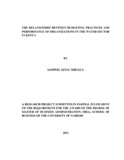| dc.contributor.author | Mbugua, Samwel G | |
| dc.date.accessioned | 2013-11-18T08:06:26Z | |
| dc.date.available | 2013-11-18T08:06:26Z | |
| dc.date.issued | 2013 | |
| dc.identifier.citation | Master Of Business Administration, University Of Nairobi, 2013. | en |
| dc.identifier.uri | http://erepository.uonbi.ac.ke:8080/xmlui/handle/123456789/59218 | |
| dc.description.abstract | The importance of the budget cannot be over emphasized considering its role in
operationalizing an organization’s strategic plan. Budgeting is defined as a forward
looking set of numbers which projects the future financial performance of a business, and
which is useful for evaluating the financial viability of the business’s chosen strategy or
deciding whether changes to the overall plan are required. Since the enactment of the
Water Act 2002, no study that the researcher is aware of has been done to determine the
extent to which organizations in the water sector have embraced budgeting practices and
how these modern practices have improved their performance. This study therefore
sought to determine the relationship between the budgeting practices and performance of
organizations in the water sector in Kenya.
The research design employed in the study was a cross-sectional research design where
the researcher studied financial performance of water service providers for 2010/2011
financial year and sought to determine the relationship between budgeting practices and
performance of these organizations in that period. In this study four aspects of budgeting
practices were studied namely; budgeting approaches, budget planning, budget controls
and participatory budgeting. Performance was measured by the degree of efficiency in
revenue collection and regression analysis used to determine the resulting relationship.
The study found that budget planning and participation in budgeting by members of staff
each have significant p-value of 0.001 which is less than the acceptable 0.05 level of
significance and thus have a positive effect on revenue collection efficiency. On the
contrary, budget control practices and budget approaches adopted were found to have
insignificant p-values of 0.651 and 0.485 respectively. Though the p-value of the entire
model is also significant at 0.002, the study concludes that budget planning and
participation in budgeting by members of staff are critical and should be emphasized in
order to improve performance of the water service providers. | en |
| dc.language.iso | en | en |
| dc.publisher | University of Nairobi | en |
| dc.title | The relationship between budgeting practices and performance of organizations in the water sector in Kenya. | en |
| dc.type | Thesis | en |
| local.publisher | College of Humanities and Social Sciences | en |

